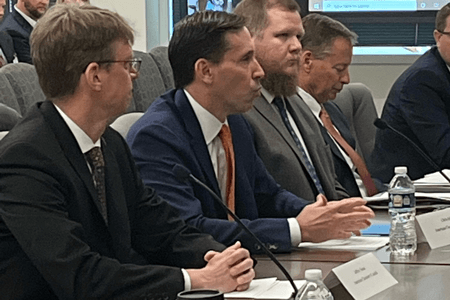
WASHINGTON (April 26, 2022) — Testifying before the Surface Transportation Board (STB), the American Chemistry Council’s (ACC) President and Chief Executive Officer, Chris Jahn told board members that serious freight rail service failures are harming chemical manufacturing and magnifying supply chain problems.
Harmful Cuts
The STB held the hearing to examine increasing reports of inconsistent and unreliable rail service from a broad range of stakeholders, including the Secretary of Agriculture. “During my time on the Board, I have raised concerns about the primacy Class I railroads have placed on lowering their operating ratios and satisfying their shareholders even at the cost of their customers,” said STB Chairman Marty Oberman. “Part of that strategy has involved cutting their work force to the bare bones in order to reduce costs. Over the last 6 years, the Class Is collectively have reduced their work force by 29% – that is about 45,000 employees cut from the payrolls. In my view, all of this has directly contributed to where we are today – rail users experiencing serious deteriorations in rail service because, on too many parts of their networks, the railroads simply do not have a sufficient number of employees.”
Growing Pains
In his testimony, Jahn pointed out that while railroads are heralding the growth in demand for chemical shipments, they are failing to provide adequate service. “This growth is good news for our industry, America’s manufacturing base, and the economy as a whole,” Jahn explained. “And it should be good news for the freight railroads that carry this traffic. However, ongoing rail service problems are putting the brakes on both our current production and future growth.”
“The problems we are experiencing today are not solely the result of the COVID-19 pandemic,” he continued. “Years of railroad decisions to cut staff, eliminate switch yards, and slash customer service resources have gutted network resilience, making service crises like this one entirely predictable, if not inevitable.”
More Action, Less Promises
Jahn closed his testimony by calling on the Board to move on enacting solutions, “We cannot rely on railroad promises that they have turned a corner and will fix these problems. The Board must adopt proactive reforms to help prevent and mitigate the next rail service crisis.”
Specifically, he urged the STB to require railroads to report meaningful data on “first mile/last mile service,” impose greater accountability on railroads for service failures and promote greater rail-to-rail competition through reciprocal switching.



